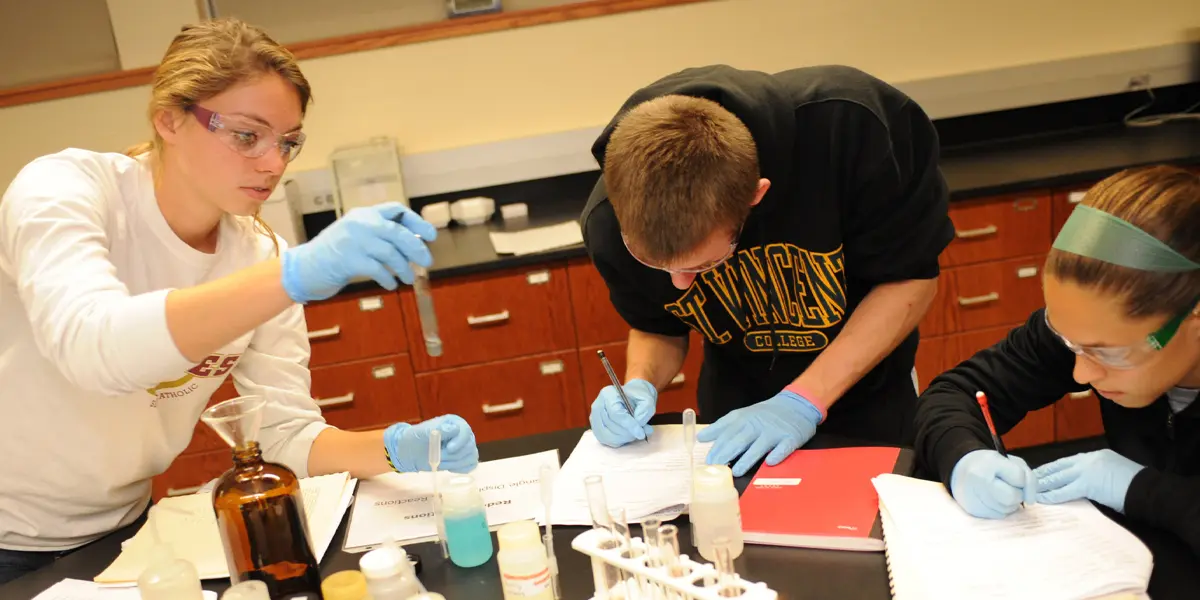Forensic Studies - Natural Science
- Minor

-
In This Section
The goal of this minor is to provide students with a broad-based understanding of the scientific aspect of forensics. The forensic studies-natural science minor is not meant to provide students with all of the skills necessary to perform the job of a forensic scientist. Rather, the goal is to provide students with a working understanding of the integration of each of these disciplines with the criminal law so that the students may, if they wish, pursue those specializations in other undergraduate or future graduate study.
Undergraduate Programs
Undergraduate Admission
Phone:
800-782-5549
Ext. 2500
Email:
admission@stvincent.edu
Curriculum Requirements
-
Requirements
Requirements for a Minor in Forensic Studies - Natural Science
Required classes: (18-19 credits)
The following courses are required:
CLS 205 Criminal Trial Evidence - 3 credits
CLS 227 Criminal Law and Process - 3 credits
NSCI 300* Criminalistics - 3 credits
Choose 3 credits (selected course may not count for major or core):
CLS 230 Constitutional Criminal Procedures - 3 credits
CLS 305 Violence and Victimology - 3 credits
CLS 340 Principles of Homeland Security - 3 credits
CLS 377 Addiction and Crime - 3 credits
Choose 6 or 7 credits from the following: (selected courses may not count for major or core; one lecture/lab combination required; NSCI courses are not recommended for physics, chemistry, biology or biochemistry majors):
NSCI 130/131 Introduction to Physics and Lab - 4 credits
NSCI 210/211 Chemistry of Crime and Lab - 4 credits
NSCI 200 All About Drugs - 4 credits
NSCI 260 Biotechnology: How Do They Do It? - 4 credits
NSCI 235/236 Human Biology and Laboratory - 4 credits
NSCI 230/231 Genes, Cells and Computers and Lab - 4 credits
BL 214/215** Molecular Genetics and Lab - 4 credits
CH 252/253 Nuclei Acids and Membranes and Lab - 4 credits
CH 216/218** Quantitative Analysis and Lab - 4 credits
BL 216/217** Biotechnology and Lab - 4 credits
BL 150/151 General Biology I and Lab - 4 credits
ES 220 Introduction to GIS - 3 credits
CH 245** Chemical and Forensic Analysis - 3 credits
* Does not count toward core.
** These courses have prerequisites that are not part of the minor.
Student Learning Outcomes
The field of forensics is a growing and dynamic one that has far outstripped its initial boundaries as a discipline only pertinent to the gathering of data at crime scenes. Today, a vast array of natural sciences has been brought to the field of criminal investigations and prosecutions. Within the next 15 years, natural scientists will be having much more interaction with the legal system and the agents and attorneys within that system will need to carry on meaningful conversations with those forensic experts in the effort to do justice in each case.
The goal of this minor is to provide students with a broad-based understanding of the scientific aspect of forensics. The forensic studies-natural science minor is not meant to provide students with all of the skills necessary to perform the job of a forensic scientist. Rather, the goal is to provide students with a working understanding of the integration of each of these disciplines with the criminal law so that the students may, if they wish, pursue those specializations in other undergraduate or future graduate study.
Undergraduate Programs
Undergraduate Admission
Phone:
800-782-5549
Ext. 2500
Email:
admission@stvincent.edu
